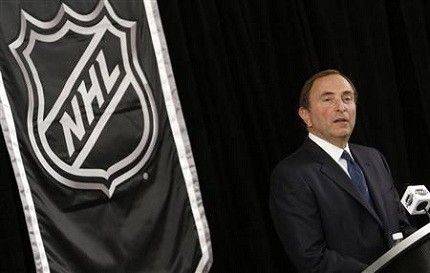NHL Close to Ending Possible Lockout?

(Reuters) - The NHL said it would work "around the clock" to reach a new labor deal with players after imposing a league-wide lockout that threatens to wipe out the upcoming season.
The lockout came into effect at 12.01 am EDT on Sunday when the previous seven-year Collective Bargaining Agreement expired at midnight on Saturday.
The league and the union representing the players had been negotiating for months but were unable to reach a new agreement before the deadline expired, automatically triggering the work stoppage.
The league has not yet cancelled any games but everything remains on hold until a new deal is signed.
The NHL's official website immediately shut down its player reference section and removed any pictures of players.
Training camps, due to start next week, were likely to be the first casualty while time was running out for the regular season to begin as scheduled on October 11.
"Despite the expiration of the Collective Bargaining Agreement, the National Hockey League has been, and remains, committed to negotiating around the clock to reach a new CBA that is fair to the Players and to the 30 NHL teams," the NHL said in a statement released on Sunday morning.
"This is a time of year for all attention to be focused on the ice, not on a meeting room. The league, the clubs and the players all have a stake in resolving our bargaining issues appropriately and getting the puck dropped as soon as possible. We owe it to each other, to the game and, most of all, to the fans."
Industrial disputes are not uncommon in North American professional sports and the NHL became the third major sport to impose a lockout in the past 18 months, following the National Football League and the National Basketball Association.
This is the fourth work stoppage for the NHL in the past two decades. The most recent was eight years ago when the entire 2004-05 season was cancelled.
With the league currently enjoying massive interest and generating record revenues, the stakes are high for both sides although neither shows signs of buckling on the key economic issues.
The main sticking point is how to divide $3.3 billion in revenue. Under the previous deal, the players received 57 percent and the league 43 but owners wanted a bigger share, arguing that while profits were rising so too were costs.
The NHL initially asked players to lower their share to 43 per cent but amended that to a six-year offer that started at 49 percent and dropped to 47 percent.
The NHL Players' Association rejected the offer, saying they wanted something closer to the previous agreement.
"While our last CBA negotiation resulted in a seismic change in the League's economic system, and produced corresponding on-ice benefits, our current negotiation is focused on a fairer and more sustainable division of revenues with the Players - as well as other necessary adjustments consistent with the objectives of the economic system we developed jointly with the NHL Players' Association seven years ago," the NHL said in a statement.
(Reporting by Julian Linden, editing by Pritha Sarkar)
© Copyright IBTimes 2025. All rights reserved.






















